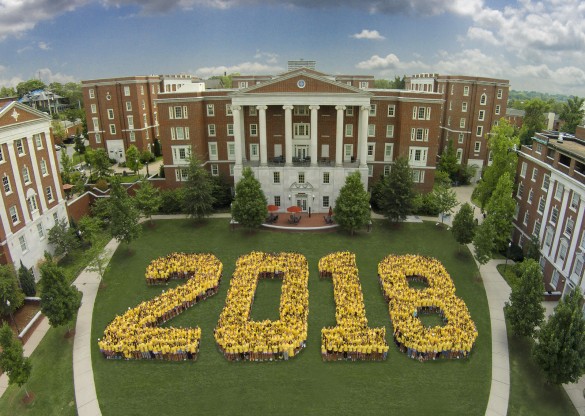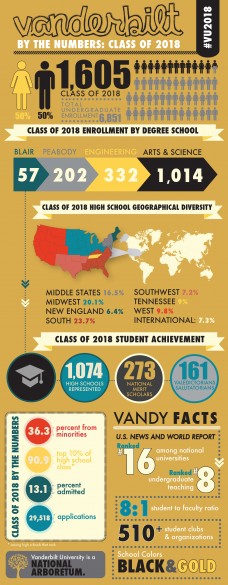
Vanderbilt University’s newest class is the most academically prepared and the most ethnically, economically and geographically diverse class in Vanderbilt’s history.
Leadership is also a key trait among the incoming class. One hundred percent of the enrolled students held the highest level of leadership, scholarship or were the most exceptionally involved student leader in their high school. Or they held leadership roles in local, regional, national or international organizations.
“One of our key goals at Vanderbilt is to provide young leaders unique learning opportunities and give them the tools, education and experiences needed to develop their full potential and ultimately to help change the world,” said Vanderbilt Chancellor Nicholas S. Zeppos.
The class of 2018 held the highest leadership accomplishments possible by winning regional or national awards for involvement, commitment, and contributions through leadership or scholarship.
- 90 percent service leaders
- 87 percent academic leaders
- 52 percent athletic leaders or champions
- 35 percent fine arts leaders
- 33 percent student government leaders
Academic excellence
Of the almost 30,000 students who applied to Vanderbilt, 13 percent were admitted into the class of 2018. The academic quality of the students is stellar with 90.9 percent ranking in the top 10 percent of their high school class. This is up from 88 percent last year. SAT scores for the middle 50 percent of the class ranged from 1430 to 1580, putting them in the 96th to 99th percentile. That is up from a range of 1410 to 1570 last year.
More than 36 percent of the class is an ethnic or racial minority, up from 33 percent last year. Seven percent of the class is international. The class is split almost 50-50 male and female.
“We selected these students for the unique experiences and perspectives they bring to the Vanderbilt community and for potential we saw in them as Vanderbilt students and world citizens,” said Douglas Christiansen, vice provost for enrollment and dean of admissions. “We’re excited for the contributions they’ll make on our campus and beyond.”
Expanded aid
The Opportunity Vanderbilt expanded aid program, in which Vanderbilt meets 100 percent of a family’s demonstrated financial need, continues to help recruit these highly selective and diverse classes. Beginning in the fall of 2009, Vanderbilt eliminated all need-based loans for admitted Vanderbilt students who are U.S. residents or eligible non-residents, choosing to substitute scholarships and grants to those with demonstrated need.
In the class of 2018, 68.6 percent of students are receiving financial assistance from Vanderbilt regardless of need and 53 percent of students are receiving assistance because of financial need.
“Access and opportunity are of the highest importance at Vanderbilt and we strongly believe that the world-class education Vanderbilt provides should be available to all qualified students,” added Christiansen.
More information on the Vanderbilt admissions process can be found at http://admissions.vanderbilt.edu/.
